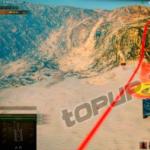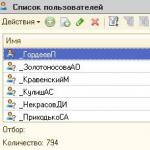Today, clients of the independent laboratory “Invitro” encountered an announcement that is atypical for our latitudes. On the doors of the institution, all visitors were greeted by the inscription: “Due to a massive hacker attack, it is impossible to take biomaterial and issue results. We apologize for the inconvenience caused." This might seem like a prank or a bad joke, but no: the hacker attack is not fiction. Information about the existence of problems with Onliner.by was confirmed by the Chairman of the Supervisory Board, Vitaly Shiyanov.
“Dear clients, due to a hacker attack on the company’s infrastructure, the time for providing a number of services in Russia and Belarus has been temporarily increased. Medical offices are operating as normal, with temporary limited CITO testing and priority testing. Research results can be obtained from personal account on the Company's website. Please note that all personal data of INVITRO clients is completely secure. We regret the current situation and are doing everything possible to correct it,”- says in official page companies on Facebook.
- There really is a hacker attack, we are now working to eliminate it. Unfortunately, because of this, we are not yet able to fully fulfill our obligations to patients and provide them with results on time. I can’t make exact forecasts yet, but we hope that from tomorrow we will restore full-fledged work, all services are working on this. So far our main problem is communication with outside world. I would like to apologize to our customers and reassure: all personal data is stored in another place and they will not be harmed,- assured Vitaly Shiyanov.
What kind of attack is this?
Obviously, the problems of the independent laboratory “Invitro” are related to the “Petya” ransomware virus, which today attacked many institutions in Russia and Ukraine. The company is part of an international holding, and therefore the difficulties of its neighbors turned out to be very close to it.
According to preliminary data, many companies were affected by the virus, which manifested itself around 14:00, including Bashneft and Rosneft, Zaporozhyeoblenergo, Dneproenergo, Dneprovskaya Electric Power System, Mondelez International, Oschadbank. , Mars, " Nova Poshta", Nivea, TESA and others. Ukrainian government computers and Auchan stores were also attacked. In addition, the virus caused a disruption in the operation of the Kyiv metro: passengers cannot pay for travel using bank cards.
A cryptolocker similar to WannaCry began to spread from the Russian Federation and Ukraine. Like the previous one WannaCry virus, the Trojan spreads independently,28.06.2017 Courier.Sreda.Berdsk NGS correspondents rented a cottage, which costs millions, in a village in the middle of a pine forest. The cottage of the commander of the Siberian National Guard, Colonel General Viktor Strigunov, was investigated by the Novosibirsk headquarters of
09.27.2019 NGS.News In the near future, a special super service “Pension Online” will be launched on the government services portal.
27.09.2019 Toguchinsky district
“The Tax Service is constantly developing service interaction with citizens.
27.09.2019
Federal Tax Service of the Novosibirsk Region
It took 2 hours to extinguish a fire with an area of about 400 square meters. Using a quadcopter, firefighters inspected the building Photo: Russian Ministry of Emergency Situations for the Novosibirsk Region Firefighters managed to extinguish the fire in the house at Sovetskaya, 15.
09.26.2019 NGS.News Author: Ksenia Gorelova, photo by the author Record: deputies considered 18 issues at the session in just 40 minutes The deputy session took place in Berdsk on September 26.
09.26.2019 Berdsk-Online.Ru
26.09.2019 Ministry of Emergency Situations of the Novosibirsk Region After the fire, the restaurant will not be able to operate until at least the end of the month. 50 people were evacuated from the burning building at night; no injuries were reported. Photo:
09.26.2019 NGS.News
Angelina DERYABIN Photo by Alexey TANYUSHIN The government of the Novosibirsk region and the Transkhimexport group of companies signed a strategic document on cooperation. A real prospect for processing our own rapeseed,
26.09.2019
Soviet Siberia
On average, the region's population lives for almost 72 years, life expectancy for men is 66 years, for women - 72 years, statisticians reported. Life expectancy has increased in the Novosibirsk region,
26.09.2019
State Television and Radio Broadcasting Company Novosibirsk
The rating of the 500 largest Russian companies was compiled by the RBC publication. Three companies from the Novosibirsk region were included in the rating of the largest in Russia; the rating of the 500 largest Russian companies itself was compiled by the RBC publication.
26.09.2019
State Television and Radio Broadcasting Company Novosibirsk
Elvira NOVIKOVA Photo courtesy of the administration of the Paletsky Village Council The villages of the Paletsky Village Council have become more comfortable in recent years. Rural children this year have the opportunity not only
26.09.2019
Soviet Siberia
Author: Ksenia Gorelova, photo from the Berdsk-online archive. A 27-year-old receptionist stole a watch, a telephone,
09.26.2019 Berdsk-Online.Ru The drink is produced in Novosibirsk, but will only be sold for six months. Unlike the usual dark Coca-Cola, the new Fanta is not just dark brown, but black Photo:
09.26.2019 NGS.News
All items were returned to their rightful owners. As the press service of the Russian Ministry of Internal Affairs for the Siberian Federal District reported, the police uncovered a series of thefts of passengers' property at Tolmachevo airport.
26.09.2019
State Television and Radio Broadcasting Company Novosibirsk
06.02.2018
On February 5, 2018, the opening ceremony of the monument to the Petya computer virus was held at the INVITRO central office on Nagatinskaya.
February 5, 2018 at central office INVITRO on Nagatinskaya held a solemn opening ceremony of the monument to the Petya computer virus.
The monument became a miniature copy of the previously installed monument in Skolkovo and symbolizes the virus defeated by the company, which paralyzed work in July 2017 information systems INVITRO. It serves as a reminder that we live in a world of cyber threats, where ensuring the safety of confidential patient data is at the forefront. As the experience of last year’s attack on the company showed, the system information security INVITRO is able to withstand external information challenges.
The opening ceremony was conducted by the founder and CEO of the company, Alexander Ostrovsky. It was also attended by Deputy General Director Vitalina Levashova, Director of the Technology Department Elena Kondrasheva, and Director of Corporate Communications Anton Bulanov.
Memorable prizes were awarded to the employees who were most active in eliminating the virus attack.
Earlier, on December 18, 2017, INVITRO for the first time in the world erected a monument to the Petya computer virus. It was installed near the building of the Skolkovo Technopark and is made in the form of a bitten hard drive.
June 27, 2017 series large companies was attacked by the Petya ransomware virus. The malware encrypted files on personal computers, and then demanded a ransom to restore access to the files. Among the blocked companies were MAERSK, MERK, the Cadbury confectionery factory in Australia, Home Credit Bank, GAZPROM, ROSNEFT and MARS in Russia, as well as INVITRO. The damage from the attack amounted to more than $8 billion.
Alexander Ostrovsky - about how a company and its team should behave during a hacker attack
Unforeseen difficulties arise for any company - large, small, existing for a long time and relatively recently, located anywhere in the world. According to Alexander Ostrovsky, co-owner of the Invitro laboratory network, difficulties should not be feared. The most important thing is to know how to get out of difficult situations and learn from them. Alexander Ostrovsky shared his company’s experience in combating the Petya virus, which affected Invitro laboratories in the summer of 2017.
Co-owner and CEO of a network of medical laboratories. ABOUT Graduated from the medical faculty of the Moscow Medical Dental Institute. N. A. Semashko, then residency in the specialty “Anesthesiology and Reanimatology”. For more than 15 years he worked as a resuscitator at the Institute of Neurosurgery named after. N. N. Burdenko. Has been involved in entrepreneurship in the healthcare field since 1991. Together with colleagues and like-minded people, he founded the OMB company (still exists today), specializing in the distribution of medical equipment and consumables, from which the Invitro laboratory network grew in 1998. Today the network has 1000 offices that operate in 4 CIS countries (Russia, Ukraine, Belarus and Kazakhstan).
Surprise attack
When it seems that everything is fine with you and your company, at that moment a bucket of water is poured on you. And the market’s assessment of you and your actions depends on how you behave. This is a win-win situation because the loser loses customers and leaves the market. Such tests come constantly: some a little more, some a little less. We had the same story with the Petya virus. It came as a big surprise to us.
VirusPetya – malware, which affects computers with an operating systemMicrosoftWindows. It encrypts all data stored on your computer's hard drive, as well as data needed to download operating system. The massive spread of the virus began on June 27, 2017 from Ukrainian enterprises, then the Russian companies, for example, Sberbank, RosNeft and Home Credit.
In May, the WannaCry virus arrived, which we were able to easily fight off. There were no signs of trouble, the entire top management of Invitro went somewhere far away, where we had an event. And as soon as we landed, the call rang that something was wrong with us. But no one knows what is happening and cannot assess the consequences of what is happening. This all happened on June 26, 2017.
We are an information technology company: we can extract information from humans, animals, oil - anywhere. We give it to the consumer, and he can do with it what he wants. Only robots work in a modern laboratory. Our defense in this zone is excellent. We also have a service part, where we have to pick up this material in order to analyze it further. And the third part is in the form of numbers (results). We have a production and marketing component. What is happening due to the virus is breaking all of our components. We have about 3 thousand computers, they all do not work. We have 230 analytical machines, of which 23 simply failed. Our Petya virus affects 400 cities from 3 countries.
I am talking about this to understand the scale of the disaster. A tsunami has hit us and is destroying everything. Patients and chief doctors start calling you, everyone is arguing and getting ready to leave you.
Fast response
At first we didn’t understand what was happening and continued to take away material. The depth of awareness and understanding came by the evening of the next day. And before that, it seemed to us that now, now, we will get everything right. In fact, I probably should have stopped right away. But all this subjunctive “should have” came later.
The speed of reaction is important - how quickly you take some actions and how professionally you maintain the communication space
We were stuck somewhere from June 27 to 28, and on June 29 we stopped taking materials and producing results. This attack did not cause any internal unrest or anxiety for me; I knew that we could handle it. But the question is - when? At some point, I began to twitch a little internally, because too much time had already passed. I thought that we would solve this in 2-3 days, but it didn’t work out. It took a week.
Teamwork
It is very important that our middle management worked fantastically and very clearly. These people worked because the entire management was abroad. Every company must be prepared for any situation. We strategize weekly and discuss what risks await us. And we thought through what and how could happen in the event of a hacker attack. And the employees were ready for such a situation. They organized a headquarters and knew what to do and made virtually no mistakes. About 1,200 people were involved in the process of implementing this task - the fight against the Petya virus.
Our guys from the IT department slept, spent the day and spent the night at work. But no one left. This is people's loyalty, and it depends on what you, as a leader of the company, have done in the previous 10 years. If you treated people well, then they are ready to work like that.
It's the same with the client. Our client’s loyalty to us is extremely high: he is ready to tolerate that we do not work. But he is ready to endure 1-2 times. We have been earning this loyalty for 25 years.
Information openness
It is important to establish a line of communication to let everyone know what is happening. You need to communicate with your community – clients and employees. We started using instant messengers for this because all our computers weren’t working. I think it’s one of the merits of our guys that they got their bearings so quickly.
You should interact with the media. Our press service worked 24/7, reporting everything that was happening with us. We did not hush up the problems that arose, but talked about them.
Instead of a resume
Every day we receive about 100 letters that contain virus-like things, and more than 1000 events occur aimed at intercepting traffic. The number of viruses is increasing.
The hackers have changed. Now these are highly professional people with one, two or three educations, who have their hands full and who perform certain tasks. They are helped by psychologists who look for holes in human consciousness. Now hacker attacks are clearly planned actions with an understanding of what the consequences will be, how people will behave, and where they will make mistakes. The weakest link here is the person, because the machine doesn’t think about anything.
We must understand that this will continue to happen. And the number of such attacks will increase. Based on our experience, we would like to convey to the community the following messages about what to do and how to behave in the event of a hacker attack.
- You must react very quickly, instantly. I think people need to be trained for such situations, there should be field exercises.
- It's important to establish a line of communication because you need to let everyone know what's going on with you. All information must be chewed over, because people often do not understand what they are being told.
- A headquarters must be created that will control the situation and coordinate the actions of employees.
- It's important to learn from what happens to you. We analyzed everything and developed an action plan for such cases.
The material was prepared based on the speech of Alexander Ostrovsky at the BuyBrand Expo 2017 exhibition.

Description
Determination method One-step immunochromatographic method for the detection of specific antigens.
Material under study Swab of mucus or nasal wash
Home visit available
Respiratory syncytial infection is an acute viral disease characterized by intoxication and damage predominantly to the lower respiratory organs with the frequent development of bronchitis, bronchiolitis, and pneumonia. The PC virus belongs to the genus Pneumovirus. The virus is very insidious: at the beginning of the disease, the manifestations of an MS infection can easily be confused with a common cold. A characteristic property of this virus is the ability to cause the formation of syncytium or pseudogiant cells in tissue culture. MS infection is widespread and is registered all year round; the maximum incidence is observed in winter and spring. The source of infection is a sick person. The virus is transmitted by airborne droplets. The leading symptom of PC infection is a dry, prolonged, paroxysmal cough, which can last up to three weeks. The disease is often (about 25% of cases) complicated by pneumonia.
Isolated microorganisms and pathogens
Information is provided about the presence or absence of respiratory syncytial virus in the biomaterial being studied.
Literature
- Infectious diseases in children. Ed. D. Murray. - M.: Publishing house. "Practice". 2006:928.
- Clinical recommendations for immunoprophylaxis of respiratory syncytial virus infection in children. 2016:16.
- Pinevich A.V., Sirotkin A.K., Gavrilova O.V., Potekhin A.A. Virology: textbook. - St. Petersburg: St. Petersburg University Publishing House. 2012:393.
Preparation
Special training not required; may be determined by the attending physician.
Indications for use
- screening studies to make a preliminary diagnosis;
- nasopharyngitis, bronchitis, bronchiolitis or pneumonia;
- assessment of the effectiveness of previously used therapy.
Interpretation of results
Interpretation of research results contains information for the attending physician and is not a diagnosis. The information in this section should not be used for self-diagnosis or self-treatment. The doctor makes an accurate diagnosis using both the results of this examination and necessary information from other sources: medical history, results of other examinations, etc.
Units of measurement in INVITRO
The test is qualitative.
Interpretation of results
In healthy people, the test result is negative. If the RS virus antigen is absent, the result “not detected” is given. If an antigen is detected, the result “detected” is given. A positive result indicates infection and carriage of respiratory syncytial virus.




